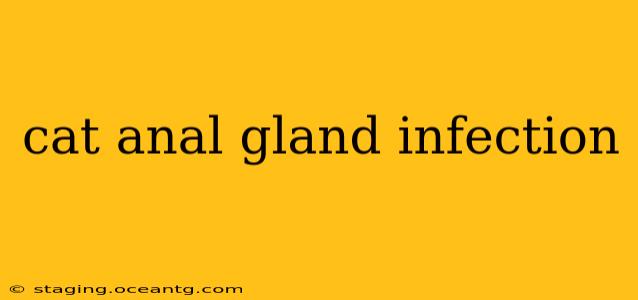Anal gland problems are a common, albeit unpleasant, issue affecting cats. While many cats manage their anal glands without issue, some develop infections or impactions that require veterinary attention. Understanding the symptoms, treatment options, and preventative measures is crucial for responsible cat ownership. This comprehensive guide will delve into the intricacies of cat anal gland infections, answering your most pressing questions.
What are cat anal glands?
Cats possess two anal sacs located on either side of the anus. These glands secrete a foul-smelling fluid that acts as a marker for territory. Normally, this fluid is released during defecation. However, various factors can lead to an inability to naturally express this fluid, resulting in an infection or impaction.
What are the symptoms of a cat anal gland infection?
Recognizing the symptoms early is vital for prompt treatment. Common signs include:
- Scooting: Your cat may drag their rear end along the floor, a classic sign of anal gland discomfort.
- Licking or biting the anal area: Excessive grooming focused on the rear is a strong indicator of irritation or pain.
- Straining during defecation: Difficulty passing stool can be linked to impacted or infected glands.
- Pain or swelling around the anus: Palpable swelling or visible redness in this area requires immediate veterinary assessment.
- Bloody or purulent discharge: Pus or blood near the anus is a serious sign of infection.
- Lethargy and loss of appetite: Severe infections can lead to systemic symptoms.
- Foul odor: A strong, unpleasant smell emanating from your cat's rear is often the first noticeable symptom.
If you notice any of these symptoms, consult your veterinarian immediately. Delaying treatment can lead to more serious complications.
How is a cat anal gland infection diagnosed?
Your veterinarian will conduct a physical examination, focusing on the anal area. They may manually express the anal glands to check for fluid consistency and presence of infection. In some cases, further tests, such as bloodwork or radiographs, may be necessary to rule out other underlying conditions.
How is a cat anal gland infection treated?
Treatment depends on the severity of the infection. Mild cases may involve manual expression of the glands by your veterinarian, along with warm compresses to relieve swelling and discomfort. More severe infections may require:
- Antibiotics: To combat bacterial infection.
- Anti-inflammatory medications: To reduce pain and swelling.
- Surgical drainage: In cases of severe abscesses or impactions.
- Anal gland removal (marsupialization): In chronic or recurrent cases, surgery to remove or alter the glands may be recommended as a last resort.
How can I prevent cat anal gland infections?
While not all anal gland issues are preventable, several measures can minimize the risk:
- High-fiber diet: A diet rich in fiber promotes regular bowel movements, helping to naturally express the anal glands. Consult your veterinarian for dietary recommendations.
- Regular exercise: Keeping your cat active encourages healthy bowel movements.
- Maintaining a healthy weight: Obesity can contribute to anal gland problems.
What is the prognosis for a cat with an anal gland infection?
The prognosis is generally good with prompt veterinary care. Early intervention significantly improves the chances of a successful outcome. However, chronic or recurrent infections may require more intensive management or surgical intervention.
Can a cat anal gland infection be fatal?
While unlikely to be directly fatal, a severe untreated infection can lead to sepsis (a life-threatening condition resulting from the body's overwhelming response to infection). Prompt veterinary care is crucial to prevent this serious complication.
How much does treatment for a cat anal gland infection cost?
The cost varies significantly based on the severity of the infection and the necessary treatment. Manual expression is relatively inexpensive, while surgery can be considerably more costly. Consult your veterinarian for an estimated cost based on your cat's specific situation.
This information is for general knowledge and does not substitute professional veterinary advice. Always consult with your veterinarian for diagnosis and treatment of your cat's health concerns.
